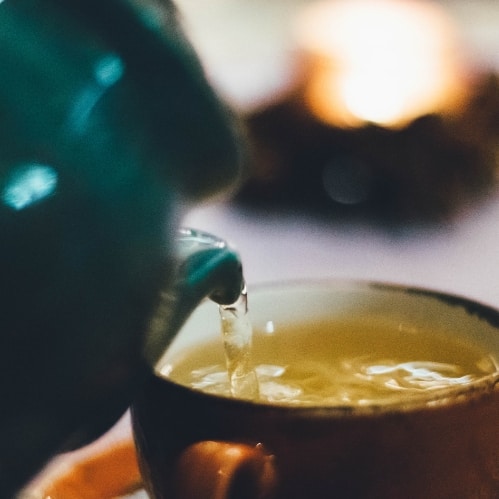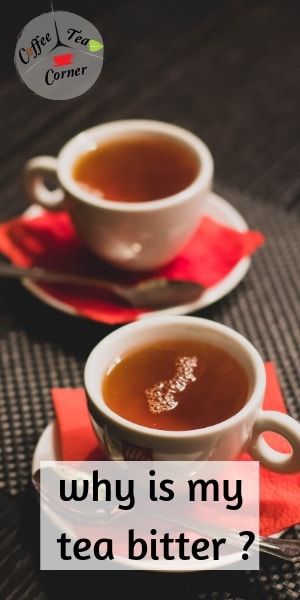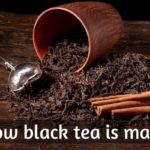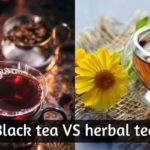If you've ever brewed a cup of tea and found it to be way too bitter, this is for you. And for me, since I have a sort of love-hate relationship with green tea. It's the most sensitive tea, and it shows its bitterness easier than its black sibling.
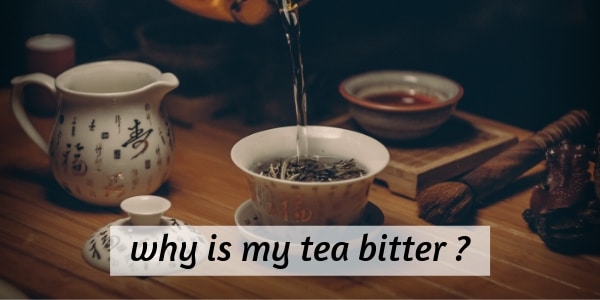
Table of Contents
So what causes tea to be bitter ?
Tea can be bitter due to tannins and theophylline, which are naturally occurring polyphenols that also double as antioxidants. These polyphenols seep out of tea leaves the longer you let the tea steep, and the hotter the water. Too many of these particles in a single cup of tea can lead to a very bitter tea.
Too much tannin or theophylline is due to oversteeping your tea, or using too much tea for one cup. Tea leaves, those from the Camellia sinensis tree, are laden with nutrients like vitamins, antioxidants, and tannins.
Brewing your tea with water that's too hot, or too many leaves can make the infusion bitter. Too many tannins are released, causing the taste to be bitter and slightly sour.
It's the dry, puckery feel you get in your mouth, in some cases giving goosebumps. Most of this can be avoided by proper brewing, and with fine quality tea leaves.
Let's get into this in more detail.
Both green and black teas are bitter because of tannins
Green tea and black tea come from the same plant, Camellia sinensis. This plant grows into a sort of small tree, and its leaves are collected to make the various teas we know today.
The adult leaves are turned into black tea, while the slightly younger ones become the green tea. The tiniest, youngest leaves and buds become white tea.
So it's these leaves that contain several nutrients and flavanols, that have the bitterness in them from the very start. The biggest culprit here is tannin. It's also an antioxidant which gives tea its health benefits from the start.
Tannins are not dangerous if you don't consume them in large quantities. The more bitter your tea, the more tannins it's got.
Not all cups of green or black tea are unpleasantly bitter, but they all are at least a bit bitter. You might notice this more or less, depending on your sensitivity, and the quality of the tea leaves themselves.
But in general, it's the tannin that's going to give you that bitter taste. It's a compound that gets released naturally when the tea is brewed, and it's part of the flavor profile of the green or black tea.
What you should know about tea is that it's an acquired taste. Not everyone likes plain black or green tea, just like not everyone likes black coffee.
It's the full flavor and bitterness, along with the extra notes and hints of fruit or honey or other delicacies. It can be too much for a lot of people, so there are blended versions available for everyone to choose from.
For example I absolutely love green tea, but whenever I oversteep it and get a bitter-ish cup I instantly hate it. That being said, I just can't drink green tea on its own. The taste is just too harsh and ... well, green.
For the past few years I've been drinking it with a combination of yellow fruits (like mango or pineapple) or flowers like rose or jasmine.
Of course, there are are many way to make your green tea easier to drink, if the taste bothers you.
The slight bitterness will still there, along with the green tea flavor. But the other notes will make it more palatable.
The quality of the tea leaves you use means everything
What does quality mean, you might ask ? Well, aside from where the tea was grown, how the plantation was controlled, and how that particular soil affects your leaves, there is another element.
You see, tea leaves are just plain leaves at first. They are picked by skilled workers who eye them for their quality and then they are all processed. There are several ways of processing tea leaves, but they all imply that the tea is heated and dried very quickly.
This will make the tea last longer, and also store better, and finally release the full flavors of the leaves. Not all leaves are the same. Some are smaller, some dry out a bit too much, some are very sensitive.
In general a high-quality loose leaf tea is one with the leaves still intact and full, even after they've been processed/dried. They are the one with the best and most flavor, and generally don't have any burnt bits.
The smaller, broken leaves are usually put into the pyramid bags we know as above average on a supermarket shelf. They can in fact be very tasty and give you a great cup of tea, but it's often not that much better than regular bagged tea.
Speaking of, this is where the crumbly, much too small bits of tea leaves end up. They can't be sold as high-quality tea leaves, even if that's where they come from.
Why does leaf size matter though ? Because smaller leaves or bits of leaves mean more surface area for the hot water to interact with, meaning it will steep much faster. And oversteeping your tea will bring out too many tannins, which will give you a bitter cup of tea.
So in short, make sure you get high-quality loose leaf tea, which steeps slower than the crumbs in the tea bags. Tea bags are okay too, but remember that you will need to steep them for much less time than loose leaves !
How you brew your tea can make it bitter too
The method and equipment you brew your tea with also makes a difference in how the tea ends up tasting. This means you're going to have to be very careful with a few aspects of making your tea, if you use a hot brew method.
I think most of us use such a method, and it's how tea was originally meant to be served. Hot, possibly with no sugar added. Just the pure flavor of whatever tea you're drinking. That doesn't mean you can't drink your tea cold, though. Just that it's more of a modern thing, iced tea or cold brewing it.
If you're using a tea ball or an infuser that's very cramped you might just end up with a weak or odd tasting tea. This is mostly because such a small space is not enough to the tea leaves to fully expand and release their flavors. Which is why a larger infuser, or an infuser mug is preferred.
When using a pot, like for several cups of tea, adding the leaves in the pot itself to steep is the best option. You can scoop them out after a few minutes, or just strain the tea when you're pouring the cups.
Depending on how you're serving the tea, this might be a bad idea since the leaves can oversteep and give you a bitter taste. Only do this with tea that you're serving to a large party, all at once.
Your water might be too hot
This is one thing that might seem frustrating at first. What do I mean by too hot ? Isn't tea water meant to be boiling hot ? Well, actually no. I used to believe that as well, especially when I was drinking herbal tea.
But it turns out no tea in the history of ever, not even herbal tea, needs to be steeped in 100 C/212 F water. More importantly, tea leaves never need to be actively boiled !
Actually boiling the tea (of any kind) will rocket it through going too bitter, and losing its flavor. The moment the tea water reaches its boiling point is when you need to turn the heat off.
Green tea needs an 80 C/176 F temperature to brew properly. That means that temperatures above this will give your a bitter tea, and you'll possibly ruin the taste as well. Green tea is more sensitive than black tea, you see, and as such needs a lower temp to brew.
Black tea needs a 90 C/194 F temperature to brew properly. It can tolerate a bit higher than that, but not boiling water. Not ever water that was literally just boiling.
For all tea waters, the best method (in terms of temperature) is to bring the water to a boil, the one you see the first bubble roiling, turn the heat off. Remove from the heat entirely if possible.
For green tea letting the boiled water stand for 2 minutes is enough, then you can add the tea leaves. For black tea, one minute is enough, then you can add the tea leaves.
You might be using too much tea
Another problem is using too much tea. I've been guilty of this, and I still get tempted to do this every now and then when I find a tea that's just too weak.
A good rule of thumb for tea is to use 2 teaspoons for 250 ml/ 8.5 oz of water. Some tea varieties might need less, some might need more. Green tea usually needs a bit less than that.
What happens if you put too many tea leaves in the water ? Your tea gets too many tannins, again. There needs to be a certain ratio of water to tannin, and it differs from person to person. So play around a little with the ratio I gave you a few lines above.
I usually like my teas strong, about an 8 on a scale from 1 to 10 (10 being strongest) so keep that in mind.
(If you like this article so far, you can pin it to your Pinterest board by clicking the image below. The article continues after the image.)
You might be oversteeping the tea
How long you steep your tea is another item to discuss, and it's starting to sound like a bit of a science, right ? Well, it's all worth it in the end. But steeping times very between green and black tea, and even between each variety even if they're the same 'color'.
For the most part, a good green tea steeped in a vessel large enough to let the leaves unfurl will need 2-4 minutes before needing to be removed.
Black tea can handle a little longer, 3-6 minutes are good enough. Again, the leaves need to have plenty of space to properly unfurl in order to give you that great cup of tea.
Oversteeping the tea will let the hot water extract more and more tannins, which will give you a bitter tea.
You can of course reuse tea leaves. Only if they are loose leaves, and keep in mind that they're going to lose their punch with every use. So your first tea batch might be great with 3 minutes infusion, but the next might need 4 or even 5 minutes.
Experiment with this, and try it out. See if you even like resteeped tea leaves. This is a method usually meant for tea parties or gatherings where lots of tea gets passed around in a short amount of time. Do not try this with herbal teas though, since they will come out much weaker.
Your water might be off
Another reason for bitter tea, even if it's the most unlikely, is that your water might be off. This can mean a lot of things, depending on where you live and how you got the water hot.
For example most tap water is safe in most countries. Especially the mountainous areas are great with water since the springs pass over so many rocks, and they're pretty much unsullied.
There are also places with a high mineral content water. That water can give you an odd tasting tea, and it can cling to the heating mechanism if you're using one of those college dorm boiler cups. Those needs to be cleaned out every few weeks, just to make sure everything is nice and clean.
Finally, if you live in the plains, your water might be a bit muddy or stale at times. That's at least what I've noticed whenever I visit some distant relatives of mine, and I can never drink the water there.
Cold brewing your tea lowers the chance of bitterness
One way to make sure your tea has a very low chance of getting bitter is to use a cold brew method. This means simply placing your tea leaves in cold or room-temp water, and leave them overnight or for 10-12 hours to steep.
This will release less tannins, and more flavor, so you'd be getting a good deal. It's just very slow and not for everyone.
Whichever way you brew your tea, if you make a large batch you're going to need to store it properly or else it will go bad. Yes, tea can and does go bad. Storing it in the fridge in an airtight glass container will help you keep it fresh for up to 72 hours, though.
Final thoughts
I know tea can be a bit confusing sometimes. It all seems so simple at first, like just making a cup of eta and you're good to go. And for the most part that's true, you can just microwave a cup of plain water, add your sugar and a teabag and you're done.
That's a perfectly okay way to drink tea if it's the one that suits you. It's just that loose leaf tea take a bit more time and effort, and you're going to need to know how to brew it properly.
I hope I helped a little with what I explained above, since some of those are rookie mistakes. I was guilty of many of them, especially oversteeping the tea since I sometimes just forget I have a cup ready and waiting for me.
Do give green and black tea another shot if you found them too bitter. For the most part they're lovely, and if you get a really good brand that you like then you're going to fall in love with all the flavors these two teas can get you.
If you want to know more about coffee or tea, feel free to check the related articles below. Who knows what else you might find ?

